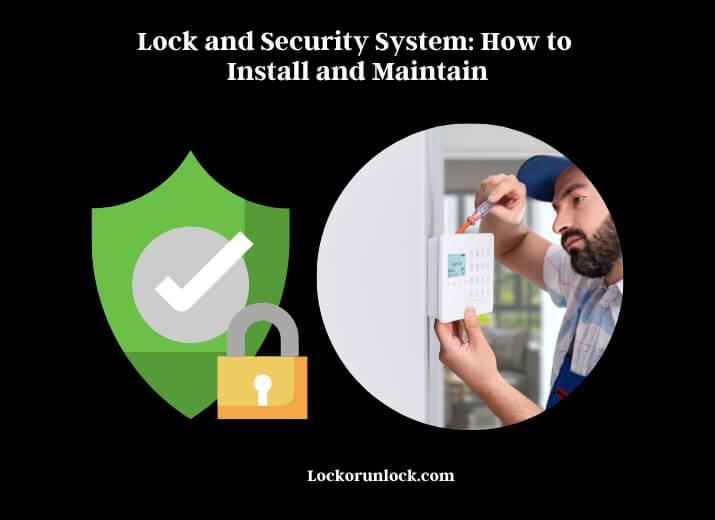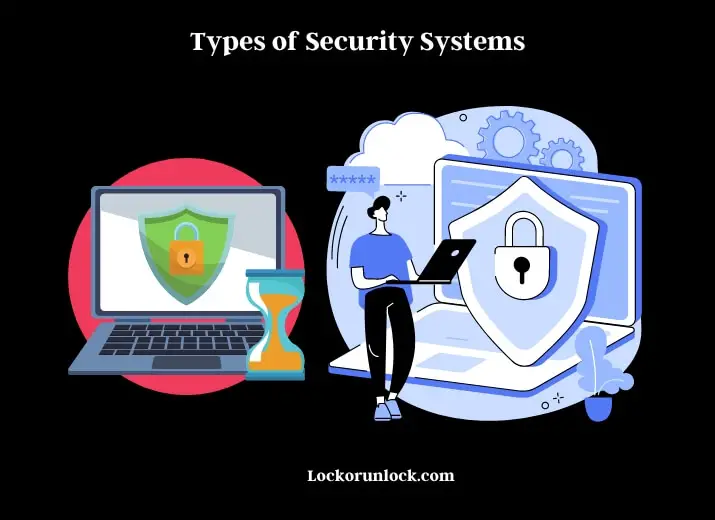Locks and security systems are essential components of any residential or commercial property, as they provide protection and peace of mind for occupants. Locks are used to securing entry points such as doors, windows, cabinets, and safes, while security systems provide an extra layer of protection by detecting and alerting occupants to potential threats.

The need for locks and security systems has existed for centuries, with evidence of locks dating back to ancient Egypt and Babylon. Locks and security systems have evolved to meet the changing needs of society, and today, there are a variety of options available to meet different security needs and budgets.
Types of Locks
Locks come in various types, each with its advantages and disadvantages. The two main categories of locks are traditional and electronic locks. Let’s take a closer look at each type:
Traditional Locks
Traditional locks are mechanical locks that operate with a physical key or combination. They are the most common type of locks and have been used for centuries.
Pin tumbler Lock
The pin tumbler lock is the most common type of lock. It consists of a series of pins that prevent the lock from opening without the correct key. The key has ridges that match the pins in the lock, allowing the key to turn and release the lock.
Wafer tumbler Lock
The wafer tumbler lock is similar to the pin tumbler lock but uses wafers instead of pins. Wafers are thin, flat pieces that prevent the lock from opening without the correct key.
Lever tumbler Lock
The lever tumbler lock is commonly used in older homes and buildings. It consists of a series of levers that must be lifted to a certain height for the lock to open.
Electronic Locks
Electronic locks are becoming increasingly popular as they provide increased convenience and security. Electronic locks use digital technology to control access.
Keypad Lock
The keypad lock requires a code to unlock. It is commonly used in commercial settings and homes.
Fingerprint Lock
The fingerprint lock uses biometric technology to scan a person’s fingerprint and grant access to the lock.
Smart Lock
The smart lock uses Bluetooth, Wi-Fi, or Zigbee technology to communicate with a smartphone, allowing for remote control and monitoring of the lock.
Types of Security Systems
Security systems are designed to detect and alert occupants to potential threats. There are two main categories of security systems: monitored and unmonitored security systems. Let’s take a closer look at each type:

Monitored Security Systems
Monitored security systems are systems that are connected to a monitoring center that provides 24/7 monitoring of the property. There are two types of monitored security systems:
Professional Monitoring
Professional monitoring involves a team of professionals who monitor the security system around the clock. If the system detects a breach, the monitoring center will contact the authorities or notify the property owner.
Self-Monitoring
Self-monitoring involves the property owner monitoring the security system themselves. The system will send alerts to the property owner’s smartphone or other devices when a breach is detected.
Security Cameras
Security cameras are devices that are designed to capture and record visual images of an area for the purpose of security and surveillance. These cameras can be placed in various locations such as homes, businesses, public places, and other areas to monitor activities and prevent potential security threats.
Unmonitored Security Systems
Unmonitored security systems are systems that are not connected to a monitoring center but still provide an extra layer of protection. There are several types of unmonitored security systems:
Motion Detectors
Motion detectors are sensors that detect movement in a specific area. When movement is detected, an alarm is triggered.
Glass Break Detectors
Glass break detectors are sensors that detect the sound of breaking glass. When the sound is detected, an alarm is triggered.
Door and Window Sensors
Door and window sensors are sensors that detect when a door or window is opened. When a door or window is opened, an alarm is triggered.
Security Alarms
Security alarms are devices that are designed to detect and alert individuals to potential security threats. These alarms can be used in a variety of settings, including homes, businesses, and public places, and are often a key component of security systems.
Choosing the Right Lock and Security System
Choosing the right lock and security system is essential for ensuring the safety and security of your property. You have to know that Many people wonder whether dread extensions can lock onto natural hair or if they’re simply a temporary fix. There are several factors to consider when selecting a lock and security system:
Level of Security
The level of security required depends on the type of property and the level of risk. For example, a commercial property may require a higher level of security than a residential property. It is important to evaluate the potential risks and vulnerabilities of your property to determine the appropriate level of security.
Type of Lock and Security System
As discussed earlier, there are different types of locks and security systems available, each with its advantages and disadvantages. It is important to research and consults with a professional to determine the best type of lock and security system for your property.
Budget
The cost of locks and security systems varies depending on the type and level of security required. It is important to set a budget and evaluate the options available within that budget.
Professional Installation
Locks and security systems should be installed by a professional to ensure proper installation and functionality. It is important to choose a reputable and experienced professional for installation.
Maintenance
Regular maintenance and inspection of locks and security systems are essential for ensuring proper functioning and identifying potential issues. It is important to follow the manufacturer’s recommended maintenance schedule and promptly address any issues.
Installation and Maintenance
Installation
Proper installation is crucial for the optimal functioning of locks and security systems. It is important to hire a professional for installation to ensure that the system is installed correctly and according to manufacturer specifications.
During installation, the professional will assess the property, determine the best placement of the locks and security systems, and ensure that all components are properly installed and connected. They will also provide guidance on how to use the system and any necessary maintenance.
Maintenance
Regular maintenance and inspection of locks and security systems are essential for ensuring optimal functioning and identifying potential issues. Here are some tips for maintaining your locks and security systems:
Check Batteries
If your locks and security systems are battery-operated, it is important to regularly check and replace the batteries. Dead batteries can cause the system to malfunction, leaving the property vulnerable.
Keep Locks Clean and Lubricated
Regular cleaning and lubrication of locks can help prevent rust and ensure smooth operation. Use a dry lubricant, such as graphite powder, to avoid attracting dirt and debris.
Test the System Regularly
It is important to regularly test the locks and security systems to ensure that they are functioning correctly. Follow the manufacturer’s recommended testing procedures, and promptly address any issues that arise.
Keep Doors and Windows in Good Condition
Proper maintenance of doors and windows can help prevent break-ins. Regularly check for cracks or damage, and promptly repair any issues.
Update the System as Needed
As technology advances and security needs change, it may be necessary to update the locks and security systems. Consult with a professional to determine if any updates are necessary.
Proper installation and maintenance are essential for ensuring the optimal functioning of locks and security systems. Hire a professional for installation, follow the manufacturer’s recommended maintenance procedures, and promptly address any issues that arise.
What Are the Best Practices for Maintaining Lock and Security Systems?
When it comes to maintaining lock security tips, regular inspections and maintenance are crucial. Keep locks clean and lubricated to prevent rust and ensure smooth operation. Monitor access control systems for any malfunctions and promptly address any issues. Stay updated on the latest security technology for optimal protection.
Summary
Locks and security systems are essential for protecting your property from theft, vandalism, and other types of crime. There are several types of locks and security systems available, each with its advantages and disadvantages. It is important to evaluate your property’s needs and consult with a professional to determine the best type of lock and security system.
Once you have chosen a lock and security system, proper installation and maintenance are essential for ensuring optimal functioning and protection. Hire a professional for installation, follow the manufacturer’s recommended maintenance procedures, and promptly address any issues that arise.
Relevant Resources:
